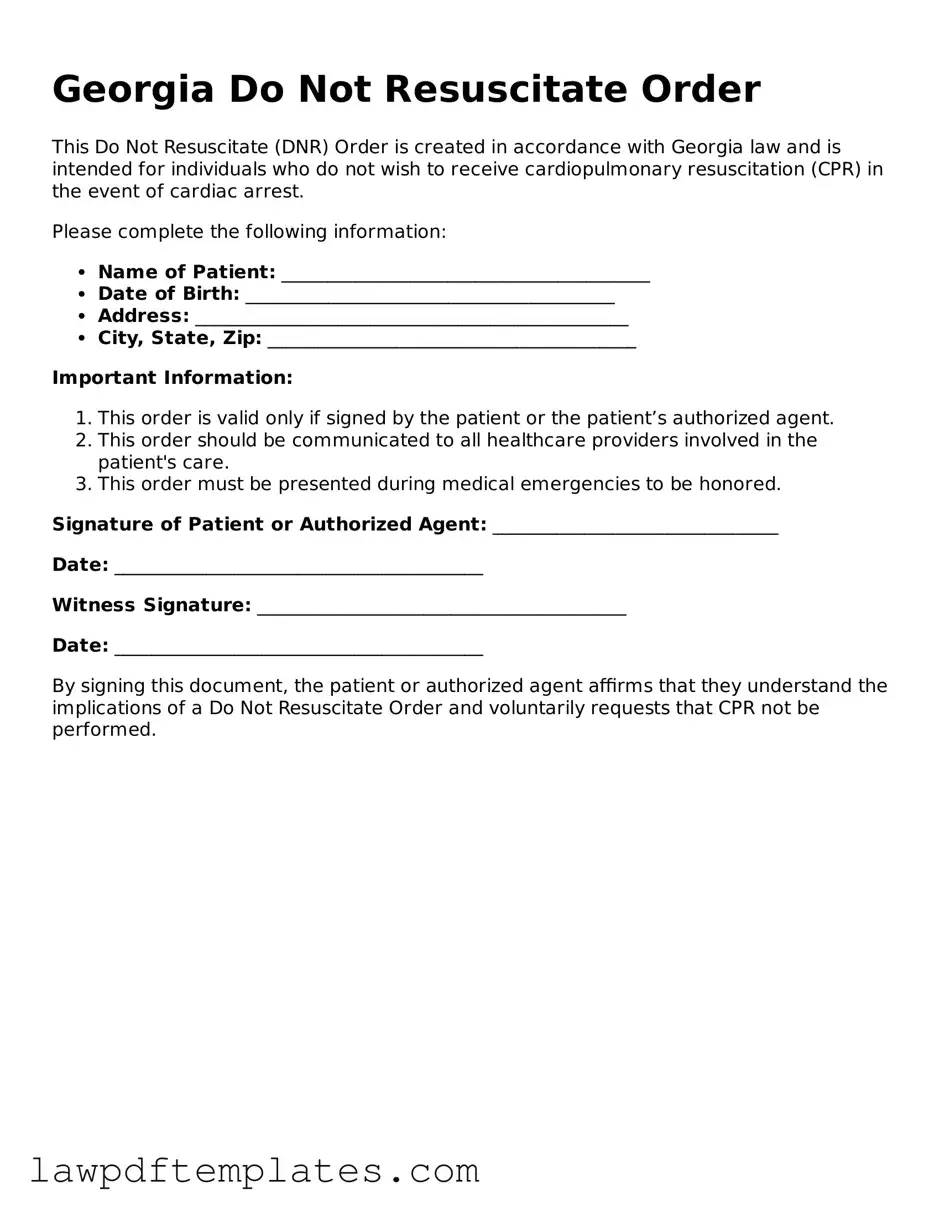Free Do Not Resuscitate Order Template for the State of Georgia
Form Breakdown
| Fact Name | Details |
|---|---|
| Definition | A Do Not Resuscitate (DNR) Order is a legal document that instructs medical personnel not to perform cardiopulmonary resuscitation (CPR) if a patient's heart stops or they stop breathing. |
| Governing Law | The Georgia Do Not Resuscitate Order is governed by the Georgia Code, specifically O.C.G.A. § 31-39. |
| Eligibility | Any adult patient can request a DNR order. It may also be requested on behalf of a minor by a parent or legal guardian. |
| Form Requirements | The DNR order must be signed by a physician and the patient or their authorized representative. It should also be dated. |
| Validity | The DNR order remains valid until revoked by the patient or their representative, or until the patient’s condition changes significantly. |
| Emergency Services | Emergency medical services (EMS) personnel are required to honor a valid DNR order, provided it is properly completed and visible. |
| Location | It is advisable for individuals to keep the DNR order in a prominent place, such as on the refrigerator or with their medical records. |
| Communication | Patients should discuss their DNR wishes with family members and healthcare providers to ensure everyone understands their preferences. |
Sample - Georgia Do Not Resuscitate Order Form
Georgia Do Not Resuscitate Order
This Do Not Resuscitate (DNR) Order is created in accordance with Georgia law and is intended for individuals who do not wish to receive cardiopulmonary resuscitation (CPR) in the event of cardiac arrest.
Please complete the following information:
- Name of Patient: ________________________________________
- Date of Birth: ________________________________________
- Address: _______________________________________________
- City, State, Zip: ________________________________________
Important Information:
- This order is valid only if signed by the patient or the patient’s authorized agent.
- This order should be communicated to all healthcare providers involved in the patient's care.
- This order must be presented during medical emergencies to be honored.
Signature of Patient or Authorized Agent: _______________________________
Date: ________________________________________
Witness Signature: ________________________________________
Date: ________________________________________
By signing this document, the patient or authorized agent affirms that they understand the implications of a Do Not Resuscitate Order and voluntarily requests that CPR not be performed.
Common mistakes
Filling out a Do Not Resuscitate (DNR) Order form in Georgia is a significant decision that requires careful consideration. Unfortunately, many people make common mistakes that can lead to confusion or complications later on. Understanding these pitfalls can help ensure that your wishes are respected.
One common mistake is not discussing the DNR order with family members or loved ones. Open conversations about end-of-life wishes are crucial. When individuals do not communicate their decisions, family members may feel uncertain or conflicted during a medical emergency.
Another frequent error is failing to sign the form. A DNR order must be signed by the patient or their legal representative. Without a signature, the document is not valid, and healthcare providers may not follow the patient's wishes.
People often overlook the importance of having the form properly witnessed. In Georgia, a DNR order requires the signatures of two witnesses or a notary public. Skipping this step can render the form ineffective, leading to unwanted resuscitation efforts.
Additionally, some individuals may not use the correct version of the DNR form. Using an outdated or incorrect form can lead to complications. Always ensure that you have the most current version, which is available through healthcare providers or state resources.
Another mistake involves not providing clear instructions regarding the DNR order. It is essential to specify whether the DNR applies to all situations or only under certain conditions. Ambiguity can lead to misunderstandings among medical staff.
Some people also fail to keep copies of their DNR order. It is important to share copies with healthcare providers, family members, and anyone involved in your care. Without proper documentation, your wishes may not be honored when it matters most.
Moreover, individuals sometimes forget to review and update their DNR orders as circumstances change. Life events, such as a change in health status or a shift in personal beliefs, may necessitate a revision of the order. Regularly reviewing the document ensures that it reflects your current wishes.
Finally, some individuals neglect to discuss their DNR order with their healthcare providers. It is essential to ensure that your medical team is aware of your wishes. This communication helps align your care with your preferences and avoids any potential conflicts during critical moments.
By being aware of these common mistakes, individuals can better prepare their DNR orders. Taking the time to fill out the form correctly ensures that personal wishes are honored and respected in times of need.
Discover More Do Not Resuscitate Order Templates for Specific States
Do Not Resuscitate Michigan - A vital tool that guides medical professionals on a patient’s resuscitation wishes.
Can You Have a Dnr at Any Age - Patients can express their end-of-life wishes through a DNR order.
For those looking to fill out the Texas Employment Verification form efficiently, you can access the necessary resources online to streamline the process. Employers can benefit greatly from utilizing the information provided at https://texasformspdf.com/fillable-texas-employment-verification-online/ which offers guidance on completing Form H1028 accurately, ensuring that all required details are submitted promptly to the Texas Health and Human Services Commission.
Dnr Do Not Resuscitate - This document should be easily accessible in times of need, such as during hospital admissions.
